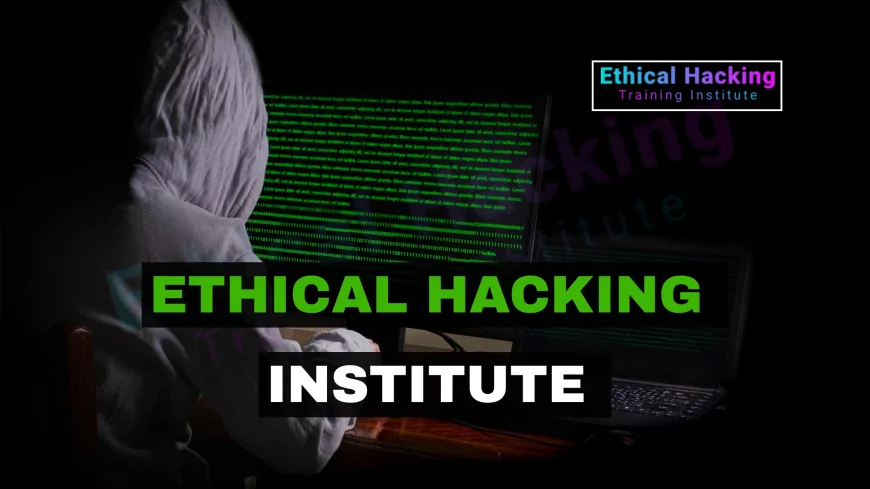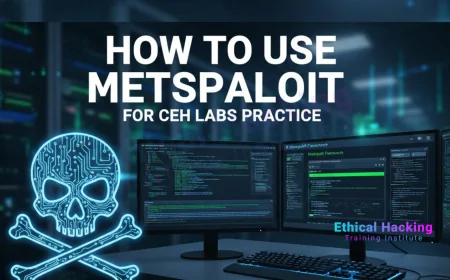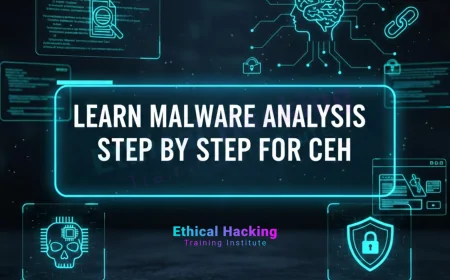Ethical Hacking Training Institute | Comprehensive Cybersecurity Courses & Certifications for Career Growth
Discover how an Ethical Hacking Training Institute equips you with essential skills, hands-on training, and globally recognized certifications like CEH and OSCP. Explore course modules, practical labs, career paths, and tips to choose the best institute to become a proficient cybersecurity professional and stay ahead in the digital security landscape.

In today’s digital world, cybersecurity has become one of the most critical aspects for individuals and organizations alike. With the rise in cyberattacks, the demand for skilled ethical hackers has skyrocketed. Ethical hacking involves legally probing systems to find vulnerabilities before malicious hackers can exploit them. This makes ethical hacking training essential for anyone aspiring to build a career in cybersecurity.
What Is Ethical Hacking?
Ethical hacking, often called penetration testing or white-hat hacking, is the authorized process of breaking into computer systems to identify security weaknesses. Unlike malicious hackers, ethical hackers work with organizations to improve their security posture by proactively discovering and fixing vulnerabilities.
Why Join an Ethical Hacking Training Institute?
Choosing a reputed ethical hacking training institute is crucial for building a solid foundation in cybersecurity. These institutes provide structured learning, hands-on practical experience, and certification guidance that pave the way for a successful career.
Key Benefits:
-
Expert-Led Training: Courses taught by industry-certified professionals with real-world experience.
-
Hands-On Labs: Access to live hacking environments and simulation labs to practice skills.
-
Updated Curriculum: Training aligned with the latest hacking tools, techniques, and security protocols.
-
Certification Preparation: Preparation for globally recognized certifications like CEH (Certified Ethical Hacker), OSCP (Offensive Security Certified Professional), and CPENT.
-
Career Support: Resume building, interview preparation, and placement assistance.
Comprehensive Course Curriculum Overview
An ethical hacking course typically covers the following modules:
-
Introduction to Ethical Hacking: Understanding the roles, ethics, and legal aspects.
-
Network Security Basics: Study of network protocols, firewalls, and intrusion detection systems.
-
Footprinting and Reconnaissance: Gathering information about the target system.
-
Scanning and Enumeration: Techniques to discover active devices, open ports, and services.
-
Vulnerability Analysis: Identifying weaknesses using tools and manual techniques.
-
System Hacking: Learning methods to gain unauthorized access ethically.
-
Malware Threats: Study of viruses, Trojans, worms, and ransomware.
-
Sniffing and Social Engineering: Techniques used to capture data and manipulate users.
-
Denial of Service Attacks: Understanding DoS/DDoS threats and mitigation.
-
Web Application Hacking: Identifying vulnerabilities in web apps such as SQL injection and cross-site scripting.
-
Wireless Network Hacking: Security testing for Wi-Fi networks.
-
Cryptography: Basics of encryption and secure communications.
-
Report Writing and Documentation: How to document findings professionally.
Practical Training: The Key to Success
Theoretical knowledge alone is insufficient for ethical hacking. Practical experience is essential to master real-world hacking scenarios. Ethical hacking training institutes emphasize:
-
Hands-on labs using platforms like Kali Linux.
-
Simulated penetration testing environments.
-
Real-time hacking exercises on virtual networks.
-
Use of industry-standard tools like Metasploit, Nmap, Burp Suite, and Wireshark.
Certifications to Advance Your Career
Ethical hacking certifications validate your skills and boost your employability. Popular certifications offered through training institutes include:
-
Certified Ethical Hacker (CEH): Ideal for beginners, covering fundamental ethical hacking concepts.
-
Offensive Security Certified Professional (OSCP): Known for its hands-on exam and advanced penetration testing.
-
Certified Penetration Testing Engineer (CPENT): Focuses on penetration testing and red teaming skills.
Career Opportunities After Training
Completing ethical hacking training opens doors to diverse cybersecurity roles such as:
-
Penetration Tester
-
Security Analyst
-
Security Consultant
-
Vulnerability Assessor
-
Cybersecurity Engineer
-
Incident Responder
Companies across sectors like finance, healthcare, IT, and government actively seek certified ethical hackers to protect their digital assets.
How to Choose the Best Ethical Hacking Training Institute?
When selecting a training institute, consider these factors:
-
Trainer expertise and certifications.
-
Course syllabus and practical exposure.
-
Student reviews and success stories.
-
Certification exam preparation support.
-
Placement assistance and career counseling.
-
Flexibility in course timings and training modes.
Conclusion
In a world increasingly reliant on digital systems, ethical hacking is vital for maintaining cybersecurity defenses. Enrolling in a reputed Ethical Hacking Training Institute equips you with the skills, knowledge, and certifications needed to excel in this fast-growing field. With hands-on training, expert mentorship, and real-world projects, you can confidently pursue a rewarding career as a cybersecurity professional.
FAQs
What is ethical hacking and why is it important?
Ethical hacking involves legally testing computer systems for vulnerabilities to prevent malicious attacks. It is vital to protect data and maintain cybersecurity.
What certifications are offered by ethical hacking training institutes?
Common certifications include CEH (Certified Ethical Hacker), OSCP (Offensive Security Certified Professional), and CPENT (Certified Penetration Testing Engineer).
Do ethical hacking courses include practical labs?
Yes, top institutes provide hands-on labs with real-world hacking scenarios using tools like Kali Linux and Metasploit.
How long does it take to complete an ethical hacking course?
Course duration varies but typically ranges from 3 to 6 months depending on the program intensity.
Can beginners join ethical hacking courses?
Yes, many institutes offer beginner-friendly courses that cover fundamentals before advancing to complex topics.
What career opportunities are available after ethical hacking training?
Graduates can pursue roles such as penetration tester, security analyst, cybersecurity consultant, and incident responder.
Is prior programming knowledge required for ethical hacking?
Basic programming skills help but many institutes provide foundational programming training within the curriculum.
How to choose the best ethical hacking training institute?
Look for experienced trainers, updated syllabus, hands-on labs, certification support, and positive student reviews.
Are ethical hacking certifications recognized globally?
Yes, certifications like CEH and OSCP are globally recognized and valued by employers.
Does ethical hacking training cover network security?
Absolutely, courses extensively cover network security, including scanning, enumeration, and exploitation techniques.
What's Your Reaction?
 Like
0
Like
0
 Dislike
0
Dislike
0
 Love
0
Love
0
 Funny
0
Funny
0
 Angry
0
Angry
0
 Sad
0
Sad
0
 Wow
0
Wow
0

















